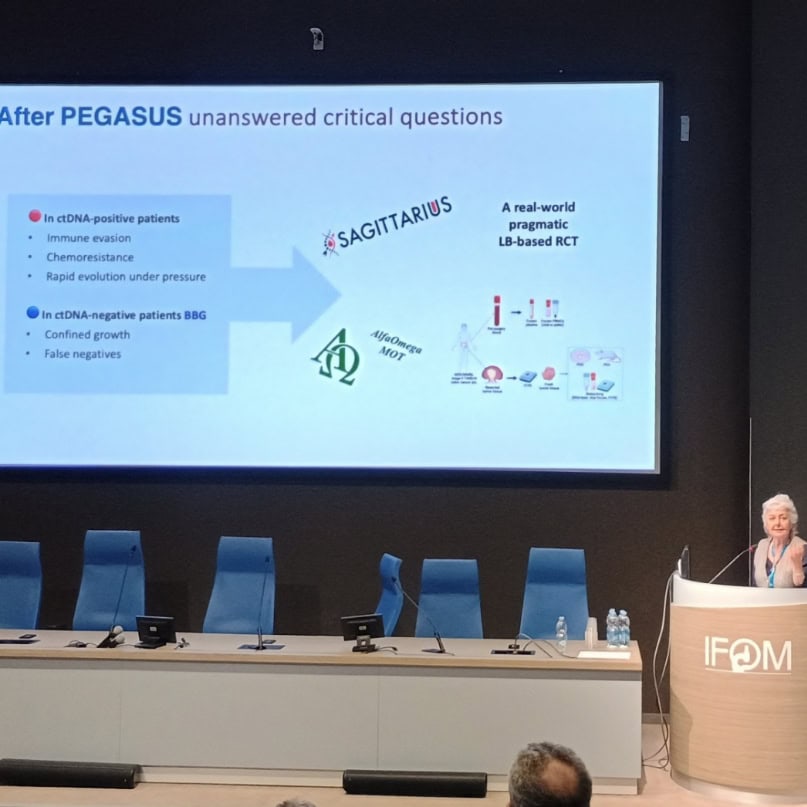May 21-22, 2025 | Milan, Italy
Liquid biopsy under the spotlight on May 22 in Milan during the Symposium “mCRC – Comprendere l’eterogeneità e l’evoluzione del carcinoma colorettale metastatico: dai meccanismi alle terapie” (“mCRC - Understanding the Heterogeneity and Evolution of Metastatic Colorectal Cancer: From Mechanisms to Therapies”). Leading experts in basic, translational, and clinical cancer research from around the world gathered at IFOM on May 21-22 to discuss the mechanisms of cancer heterogeneity and evolution, particularly in colorectal cancer, and its therapeutic implications.
Among others, the event featured several talks dedicated to the emerging, minimally invasive procedure of liquid biopsy, which holds the promise of changing the clinical landscape in the management of various cancer types.
Jeanne Tie (Peter MacCallum Cancer Centre, Australia), Nitzan Rosenfeld (Barts Cancer Institute, Queen Mary University of London, UK), and Salvatore Siena (Niguarda Cancer Center and University of Milan, Principal Investigator of the SAGITTARIUS trial coordinating centre in Italy) presented data and discussed the transformative potential of circulating tumor DNA (ctDNA) in early diagnosis, postoperative monitoring, and personalized treatment planning in different clinical settings. Along with them, Silvia Marsoni (IFOM), SAGITTARIUS project’s Scientific Coordinator, highlighted how liquid biopsy is poised to revolutionize early-stage colon cancer care by revealing the molecular complexity of micrometastatic disease. She delivered an overview of the PEGASUS trial, which demonstrated that ctDNA can detect minimal residual disease after surgery in patients with localized colon cancer. These insights are now being expanded in the SAGITTARIUS clinical trial, which study design, objectives, and current progress Marsoni detailed.
“If successful, SAGITTARIUS could completely change the way we treat early-stage colon cancer,” commented Silvia Marsoni. “By tailoring treatments to the molecular characteristics of each tumor, we can treat patients with residual disease more precisely and effectively. Even more importantly, by identifying which patients truly need chemotherapy and which do not, we can spare many patients from unnecessary toxicity and improve their quality of life—without compromising outcomes.”
About the Symposium
The Symposium “mCRC – Understanding the Heterogeneity and Evolution of Metastatic Colorectal Cancer: From Mechanisms to Therapies” was a dissemination event to mark the culmination of 7 years of groundbreaking research into metastatic colorectal cancer (mCRC), funded by the AIRC Foundation for Cancer Research and coordinated by Alberto Bardelli (IFOM). This research initiative has involved over 2,500 patients, 12 research units, and 25 clinical centers across Italy, Spain, and Germany, leading to over 140 scientific publications and 5 interventional clinical trials, establishing a robust infrastructure for translational oncology research and the foundations for the SAGITTARIUS project.
More about SAGITTARIUS
For further information or to participate in the trial, please contact clinical.trials@ifom.eu.
To learn more about the SAGITTARIUS project:
- Media contact: info@sagittarius-horizon.eu
- Social media: LinkedIn, Facebook, X, Instagram, YouTube
- Subscribe to the SAGITTARIUS newsletter

